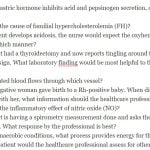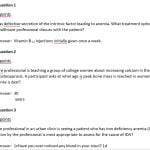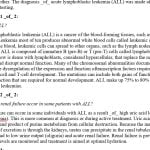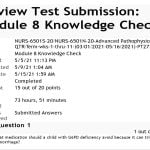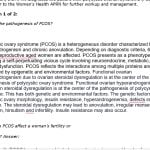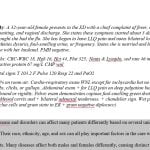COURSE
NURS 6501 Advanced Pathophysiology
NURS 6501 Module 1 Week 1 Discussion: Alterations in Cellular Processes
NURS 6501 Week 1 Discussion; Alterations in Cellular Processes- 2nd Scenario
NURS 6501 Module 1 Assignment: Week 2 Case Study Analysis
NURS 6501 Week 2 Module 1 Assignment: Case Study Analysis
NURS 6501 Module 2 Knowledge Check; Week 3
NURS 6501 Week 3 Knowledge Check; Cardiovascular and Respiratory Disorders
NURS 6501 Module 3; Gastrointestinal an...
Read More
COURSE
NURS 6501 Advanced Pathophysiology
Question: A person has abnormally severe tooth decay and erosion of the tooth enamel. What problem should the health care professional assess the person for?
Question: A preschool teacher notices a child who has burrows on the hands that are several millimeters to 1 cm long, papules, and vesicular lesions. What other assessment finding would help the teacher determine the type of infestation the child has?
Question: A healthcare p...
Read More
COURSE
NURS 6501 Advanced Pathophysiology
Question: When endothelial cells are injured, what alteration contributes to atherosclerosis?
Question: What does the healthcare professional tell the patient about this condition?
Question: A patient has been admitted for a possible small intestinal obstruction. What is the first sign the healthcare professional assesses for that would indicate the presence of this condition?
Question: Autocrine stimulation is the ability of c...
Read More
COURSE
NURS 6501 Advanced Pathophysiology
Question: Which gastric hormone inhibits acid and pepsinogen secretion, as well as decreases the release of gastrin?
Question: What is the cause of familial hypercholesterolemia (FH)?
Question: If a patient develops acidosis, the nurse would expect the oxyhemoglobin dissociation curve to react in which manner?
Question: A patient had a thyroidectomy and now reports tingling around the mouth and has a positive Chvostek sign. Wha...
Read More
COURSE
NURS 6501 Advanced Pathophysiology
NURS 6501N-16, Advanced Pathophysiology; Week 11 Final Exam
Question: A patient has defective secretion of the intrinsic factor leading to anemia. What treatment option does the healthcare professional discuss with the patient?
Question: A health care professional is teaching a group of college women about increasing calcium in the diet to prevent osteoporosis. A participant asks at what age is peak bone mass is reached in women. Wh...
Read More
COURSE
NURS 6501 Advanced Pathophysiology
All Questions are correct from Question 1 -101
Question: What is the link between major depression and cortisol secretion?
Question: A patient has chronic anemia associated with chronic renal failure. What substance does the healthcare professional tell the patient is needed to treat this anemia?
Question: What is the first indication of nephrotic syndrome in children?
Question: A patient is in the Emergency Department with he...
Read More
COURSE
NURS 6501 Advanced Pathophysiology
Question: A ten-year-old boy is brought to clinic by his mother who states that the boy has been listless and not eating. She also notes that he has been easily bruising without trauma as he says he is too tired to go out and play. He says his bones hurt sometimes. Mother states the child has had intermittent fevers that respond to acetaminophen. Maternal history negative for pre, intra, or post-partum problems. Child’s past medical his...
Read More
COURSE
NURS 6501 Advanced Pathophysiology
Question: The urine of a neonate is more dilute than adult urine because blood flow preferentially goes to nephons with short loops.
Question: Which of the following characteristics of Impetigo is FALSE?
Question: Redness and tenderness of skin that becomes widespread, followed by painful blisters, bullae, and sloughing of skin describes which of the following conditions?
Question: An infant with a congenital defect invo...
Read More
COURSE
NURS 6501 Advanced Pathophysiology
NURS 6501 Module 7 Week 10 Knowledge Check; Womens and Mens Health, Infections, and Hematologic
Question: A 28-year-old woman presents to the clinic with a chief complaint of hirsutism and irregular menses. She describes irregular and infrequent menses (five or six per year) since menarche at 12 years of age. She began to develop dark, coarse facial hair when she was 14 years of age, but her parents did not seek treatment or medical op...
Read More
COURSE
NURS 6501 Advanced Pathophysiology
NURS 6501 Module 7 Week 10 Assignment; Case Study Analysis - Reproductive Health and Disorders
Case Study: A 32-year-old female presents to the ED with a chief complaint of fever, chills, nausea, vomiting, and vaginal discharge. She states these symptoms started about 3 days ago, but she thought she had the flu. She has begun to have LLQ pain and notes bilateral lower back pain. She denies dysuria, foul-smelling urine, or frequency. Stat...
Read More


